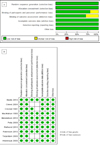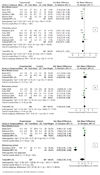1. Committee on Sports Medicine. Risks in distance running for children. Pediatrics. 1990. 86:799–800.
2. Archibald AB, Graber JA, Brooks-Gunn J. Associations among parent-adolescent relationships, pubertal growth, dieting, and body image in young adolescent girls: A short-term longitudinal study. J Res Adolesc. 1999. 9:395–415.

3. Beets MW, Mitchell E. Effects of yoga on stress, depression, and health-related quality of life in a nonclinical, bi-ethnic sample of adolescents: A pilot study. Hisp Health Care Int. 2010. 8:47–53.

4. Biddle S. Children, exercise and mental health. Int J Sport Psychol. 1993. 24:200–216.
5. Bidwell S, Jensen MF. Topfer LA, Auston I, editors. Chapter 3: Using a search protocol to identify sources of information: The COSI model. A Text on Health Technology Assessment (HTA) Information Resources. 2004. Bethesda, MD: National Information Center on Health Services Research and Health Care Technology (NICHSR), US National Library of Medicine.
6. Calfas K, Taylor W. Effects of physical activity on psychological variables in adolescents. Pediatr Exerc Sci. 1994. 6:406–423.

7. Cho YH, Rho BI. The effect of geriatric health exercise on depression with special reference to Naegong gymnastics. Korean J Care Work. 2009. 12:5–12.
8. Chung MS, Ko KH, Kim YO. The effect of an obesity control program for children in pediatric and adolescent psychiatric hospital. J Korean Acad Psychiatr Ment Health Nurs. 2011. 20:71–80.

9. Crawford MJ, McGuire H, Moncrieff J, Martinsen EW. Exercise therapy for depression and other neurotic disorders (Protocol for a Cochrane review). Cochrane Library. 2002. (4):
10. Crews DJ, Lochbaum MR, Landers DM, Crews DJ, Lochbaum MR, Landers DM. Aerobic physical activity effects on psychological well-being in low-income Hispanic children. Percept Mot Skills. 2004. 98:319–324.

11. Crocker PR, Grozelle C. Reducing induced state anxiety: Effects of acute aerobic exercise and autogenic relaxation. J Sports Med Phys Fitness. 1991. 31:277–282.
12. Dechamps A, Diolez P, Thiaudiere E, Tulon A, Onifade C, Vuong T, et al. Effects of exercise programs to prevent decline in health-related quality of life in highly deconditioned institutionalized elderly persons: A randomized controlled trial. Arch Intern Med. 2010. 170:162–169.

13. Herman-Tofler LR, Tuckman BW. The effects of aerobic training on children's creativity, self-perception, and aerobic power. Child Adolesc Psychiatr Clin N Am. 1998. 7:773–790.

14. Higgins J, Green S, editors. Cochrane handbook for systematic reviews of interventions version 5.1.0. The Cochrane Collaboration. 2011. Retrieved March 30, 2011. from
http://www.cochrane-handbook.org.
15. Kim OH, Park JK. The effects of participation in exercise and nutrition education program on physical fitness, dietary habits and nutrition intake status for adolescents. Korean J Obes. 2012. 21:158–165.

16. Kim TS. The effect of stage based exercise program on obesity index, blood components, health-related physical fitness and self-esteem in obese adolescents. 2007. Nonsan: Konyang University;Unpublished master's thesis.
17. Larun L, Nordheim LV, Ekeland E, Hagen KB, Heian F. Exercise in prevention and treatment of anxiety and depression among children and young people. Cochrane Database Syst Rev. 2006. (3):CD004691.

18. Lee HG. The influence of walking intervention on severity of depressive symptoms in adolescents. 2008. Daegu: Keimyung University;Unpublished master's thesis.
19. Lee HS. Relation of the self differentiation, self-esteem and mental health in adolescents. J Korean Acad Psychiatr Ment Health Nurs. 2011. 20:199–207.

20. MacMahon JR, Gross RT. Physical and psychological effects of aerobic exercise in delinquent adolescent males. Am J Dis Child. 1988. 142:1361–1366.

21. Melnyk BM, Small L, Morrison-Beedy D, Strasser A, Spath L, Kreipe R, et al. Mental health correlates of healthy lifestyle attitudes, beliefs, choices, and behaviors in overweight adolescents. J Pediatr Health Care. 2006. 20:401–406.

22. Mendelson T, Greenberg MT, Dariotis JK, Gould LF, Rhoades BL, Leaf PJ, et al. Feasibility and preliminary outcomes of a school-based mindfulness intervention for urban youth. J Abnorm Child Psychol. 2010. 38:985–994.

23. Petty KH, Davis CL, Tkacz J, Young-Hyman D, Waller JL, Petty KH, et al. Exercise effects on depressive symptoms and self-worth in overweight children: A randomized controlled trial. J Pediatr Psychol. 2009. 34:929–939.

24. Rethorst CD, Landers DM, Nagoshi CT, Ross JT, Rethorst CD, Landers DM, et al. Efficacy of exercise in reducing depressive symptoms across 5-HTTLPR genotypes. Med Sci Sports Exerc. 2010. 42:2141–2147.

25. Robinson TN, Matheson DM, Kraemer HC, Wilson DM, Obarzanek E, Thompson NS, et al. A randomized controlled trial of culturally tailored dance and reducing screen time to prevent weight gain in low-income African American girls: Stanford GEMS. Arch Pediatr Adolesc Med. 2010. 164:995–1004.
26. Scully D, Kremer J, Meade MM, Graham R, Dudgeon K. Physical exercise and psychological well being: A critical review. Br J Sports Med. 1998. 32:111–120.

27. Seo EH. Effects of the Behas exercise program on physical strength, depression and life satisfaction in the institutionalized elderly. 2011. Gwangju: Chonnam University;Unpublished doctoral dissertation.
28. Terjestam Y, Jouper J, Johansson C. Effects of scheduled qigong exercise on pupils' well-being, self-image, distress, and stress. J Altern Complement Med. 2010. 16:939–944.

29. Timonen L, Rantanen T, Timonen TE, Sulkava R, Timonen L, Rantanen T, et al. Effects of a group-based exercise program on the mood state of frail older women after discharge from hospital. Int J Geriatr Psychiatry. 2002. 17:1106–1111.

30. Weintraub DL, Tirumalai EC, Haydel KF, Fujimoto M, Fulton JE, Robinson TN, et al. Team sports for overweight children: The Stanford Sports to Prevent Obesity Randomized Trial (SPORT). Arch Pediatr Adolesc Med. 2008. 162:232–237.





 PDF
PDF ePub
ePub Citation
Citation Print
Print






 XML Download
XML Download